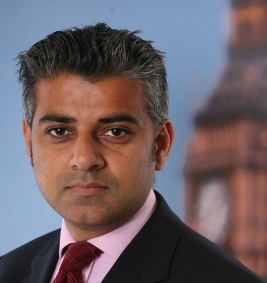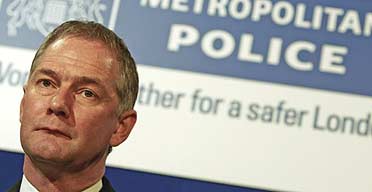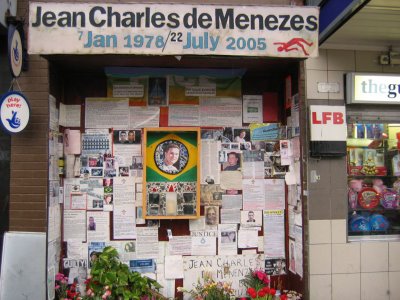 Reading Sir Christopher Rose's report (PDF) into the bugging of Sadiq Khan MP while he visited Babar Ahmed at Woodhill prison, you have to wonder what exactly the point of the whole exercise was. The findings may as well have been written by the police themselves; so unquestioning is Rose of the officers he interviewed who authorised the bugging, that he writes this in the 9th paragraph of the 18-page report:
Reading Sir Christopher Rose's report (PDF) into the bugging of Sadiq Khan MP while he visited Babar Ahmed at Woodhill prison, you have to wonder what exactly the point of the whole exercise was. The findings may as well have been written by the police themselves; so unquestioning is Rose of the officers he interviewed who authorised the bugging, that he writes this in the 9th paragraph of the 18-page report:
I have borne in mind, in relation to all of those from whom I have obtained information, the possibility that serving some interest of their own might inspire a departure from candour and that none of them has been subject to the rigour of cross-examination such as a trial process would provide.
In other words they might have told me a complete cock and bull story, but nonetheless I've taken their comments in the spirit in which they were given. This is hardly the way to run any sort of investigation, let alone one into the bugging of an MP.
A good place for Rose to have started his inquiry might have been to talk to the former detective sergeant Mark Kearney, now facing what appear to be highly trumped up charges for "aiding and abetting gross misconduct in a public office". This is related to how Kearney was a source for local Milton Keynes Citizen journalist Sally Murrer, but the police themselves admit that no money passed between their hands. The Citizen is so dirt poor that its journalists are currently out on strike over pay and conditions; it simply couldn't afford the cheque-book journalism of the nationals. Kearney was just the sort of source those local journalists who get out of their offices on occasion have always had. The charges are supposedly based on stories Kearney told Murrer about a drug dealer and a footballer, but that now seems like the excuse for getting rid of him after he objected to bugging an MP. Kearney has since suffered a nervous breakdown because of the charges, while Murrer, a respected journalist, had her phone bugged, her home raided and was strip-searched after being arrested.
It's therefore rather surprising to read that Rose, who refers to Kearney as "X" in the report, hasn't talked to him. His reasons are as follows:
With regard to the former police officer, identified in the media, awaiting Crown Court trial on serious charges, to whom I shall refer as X, I have taken into account a further factor in addition to those referred to in the last paragraph. He is entitled to a fair trial. It would be highly unfortunate if the conduct of my inquiry were to have, or could be claimed to have, an adverse impact on that right.
Seeing as he's not been charged in relation with the bugging of Khan, how could talking to him possibly have an adverse impact on his right to a fair trial?
I have a statement from the then Deputy Governor of Woodhill (Mr Robert Davis) to whose office X had regular access and with whom Prison Intelligence Officers from Thames Valley Police (TVP) including X, had daily contact. I am also aware that, representing TVP, between mid-2004 and January 2007, X attended a total of about 17 regular meetings, every two or three months, of the ACPO Prison Intelligence Working Group chaired by Commander Sawyer of the Metropolitan Police Service (MPS). Those meetings were attended by, among others of varying ranks from Detective Constable upwards, Detective Superintendent McKinney, Head of the Counter-Terrorism Prisons Intelligence Unit and Detective Superintendent Report of Investigation Deal, Head of the Prison Advisers Section. Furthermore, Detective Superintendent McKinney, in the course of reviewing technical capability at Woodhill Prison, met X and other officers from TVP Prison Intelligence Unit on 3 September 2006, which was only a few weeks after Mr Khan’s last visit to Babar Ahmad in late June. At none of the many meetings which I have identified did X express to anyone concerns of any kind as to how counter-terrorism surveillance in prison was being carried out by him or anyone else. Nor did X take the less formal opportunities of access to Mr Davis to express any such concerns. Nor did he express such concerns to either of his two colleagues in TVP Prison Intelligence Unit based at Woodhill. In the light of these matters, I concluded that it was neither necessary nor appropriate for me either to seek information from X at this time or to delay this report until the criminal proceedings against him have been completed.
Rose doesn't mention if there were minutes taken of any of these meetings, which would show whether Kearney actually had raised his concerns. Instead it seems that he's simply taken the words of the officers at face value that he didn't ask questions about the righteousness of bugging an MP. The latest Private Eye (No. 1204) suggests that a Special Branch detective superintendent specifically thanked Kearney at one of these meetings for bugging Khan. This would presumably be McKinney. Rose has therefore dismissed any need to talk to Kearney, either because it might prejudice his trial but also because his superiors would be in trouble if they admitted that they had knowingly bugged an MP, and they told him that Kearney hadn't said anything to them about it. Brilliant!
Khan, in his statement to the inquiry, has quite reasonably expressed his exasperation and anger that the those authorising the bugging of Ahmed didn't know who he was, stating "[I]t beggars belief that [the police and prison authorities] did not know who I was". This isn't just someone with an ego throwing their weight around when they're not recognised; as Khan states, he visited Ahmed in 2004 on a legal visit before he dropped his work as a solicitor and became the Labour parliamentary candidate for Tooting. Khan was well known to the Met especially: for one, he was the National Black Police Association's solicitor, while he performed the same role for detective superintendent Ali Dizaei, who "Sir" Ian Blair was found guilty of overseeing the bugging of. Since the bugging, the police have quite openly said they knew of Khan, even allegedly describing him as a "subversive", presumably because he worked for Liberty. That they hadn't followed his move from lawyer to member of parliament is hardly likely.
The man who ultimately authorised the bugging of Khan was none other than our old friend the head of the Metropolitan police's counter-terrorism unit, Andy Hayman. He presided over the Forest Gate debacle, while he was also the officer severely reprimanded by the second IPCC report into the death of Jean Charles de Menezes. He resigned last December after other allegations were made that he had ran up expenses of £15,000 on police credit cards, and taken a female officer on foreign trips with him. He denies both. Rose writes this of what the bugging of Khan actually contained:
I called for the product of the monitoring on 21 May 2005 and 24 June 2006. It is obvious from the product that the conversation monitored on 21 May contained material plainly showing that Mr Khan was an MP. The record of monitoring on 24 June contains an express reference to him being an MP. It follows that those officers who monitored the visits and reviewed the detail of the product later had knowledge of that fact. There is nothing to suggest that any of these officers believed at the time that this fact was of any significance in relation to the surveillance.
This is important, as Rose goes on to record
That authorisation, subject to monthly review and three monthly renewal, effectively remained in force until December 2006. It was reviewed on 7 June by Mr Fuller and on 14 June 2005 by Mr Hayman. The record of that review indicates that information had been gained that a recently elected Member of Parliament had offered Babar Ahmad help to fight extradition but there is no indication that the Member of Parliament in question was Mr Khan. In relation to 24 June 2006, the authorisation was reviewed on 7 June 2006 by another Detective Constable, recommended to ACPO rank by Detective Superintendent McKinney, agreed to by Deputy Governor Davis and continued by Mr Hayman on 9 June 2006.
Hayman and all the other officers involved in authorising the surveillance would have presumably had the transcript of the first visit from the year previous where it was made obvious that Khan was an MP. Did they actually read it? If they had, they would surely have realised that Khan was the recently elected MP who had offered help to Ahmed to fight his extradition. There are a couple of other possibilities: that they were dealing with so many of these requests to bug terrorist suspects and those convicted alike that they were effectively just rubber-stamping them; or that they knew full well that Khan was an MP, were complicit in the bugging, and lied to Rose that they didn't know who he was.
Khan had submitted his request to visit Ahmed under the Approved Visitors Scheme for Category A prisoners prior to becoming an MP. This entailed him being visited by a detective constable from Special Branch, where he made clear that he had given up being a solicitor and was the Labour parliamentary candidate for Tooting. The DC recorded that Khan was "very affable and forthcoming". The report seems to consider that he was at fault for not thereafter informing the prison service that he was now an MP, where he didn't need to use the scheme at all. It seems if anything that the police and prison service took advantage of Khan's mistake, rather than it being his fault for not announcing himself properly.
Rose is quite right in concluding that the officers actually doing the bugging shouldn't have been expected to either know that Khan was an MP or of the Wilson doctrine, but those who authorised it certainly should have done. What they're relying on, apart from their denials that they knew that Khan was an MP, is that bugging as such isn't covered by the Wilson doctrine, which only deals with intercepts. Therefore, seeing as it was all done legitimately, this has been blown out of all proportion and MPs have been getting out of their prams for no good reason. At least, that seems to be the impression that the government wants to convey and that also the police want to remain. Rose also, despite the notable report in the Telegraph just over a week ago, says that there have been no requests to monitor legal visits to prisoners since 2005. As Spy Blog asks, what about prior to 2005?
Seeing as Jacqui Smith has since said that the law and guidelines covering bugging will be reviewed and that all visits by MPs to constituents must be confidential, is that the end of the matter? Well, no. The report is simply inadequate. As David Davis said, Rose concluded that there was "no useful purpose" in explaining the series of police authorisations, which on the contrary would have opened up why junior officials knew that Khan was an MP yet those authorising it claimed not to. Not to interview Kearney is frankly astonishing. It was also completely beyond the inquiry's remit to ask exactly why it was necessary to bug Ahmed in the first place. He's never faced any charges in this country, but is continuing to bring a civil case against the Met, alleging he was assaulted during his original arrest; something attested to by photos showing his injuries, but the officers were cleared by the Independent Police Complaints Commission. Was that the real reason why he was bugged, or was it at the request of the US? The report shows that almost 20 people, mostly with names of Middle Eastern origin were on his visitor list, but that hardly on its own justifies the continuing bugging of everyone who visits him on the grounds of "ascertaining the extent of Babar Ahmad’s terrorist activities and contacts within the United Kingdom." It also does nothing about the situation that Kearney himself and Murrer are still in; if every police officer were being charged purely for being a local newspaper journalist's source, there'd be even less on the streets than there currently are. If this isn't a whitewash, it's hardly got anywhere near to the bottom of just a small section of our fast expanding surveillance society.Labels: Andy Hayman, Babar Ahmed, bugging, Mark Kearney, Sadiq Khan, Sally Murrer, Sir Christopher Rose, Wilson doctrine, Woodhill bugging





